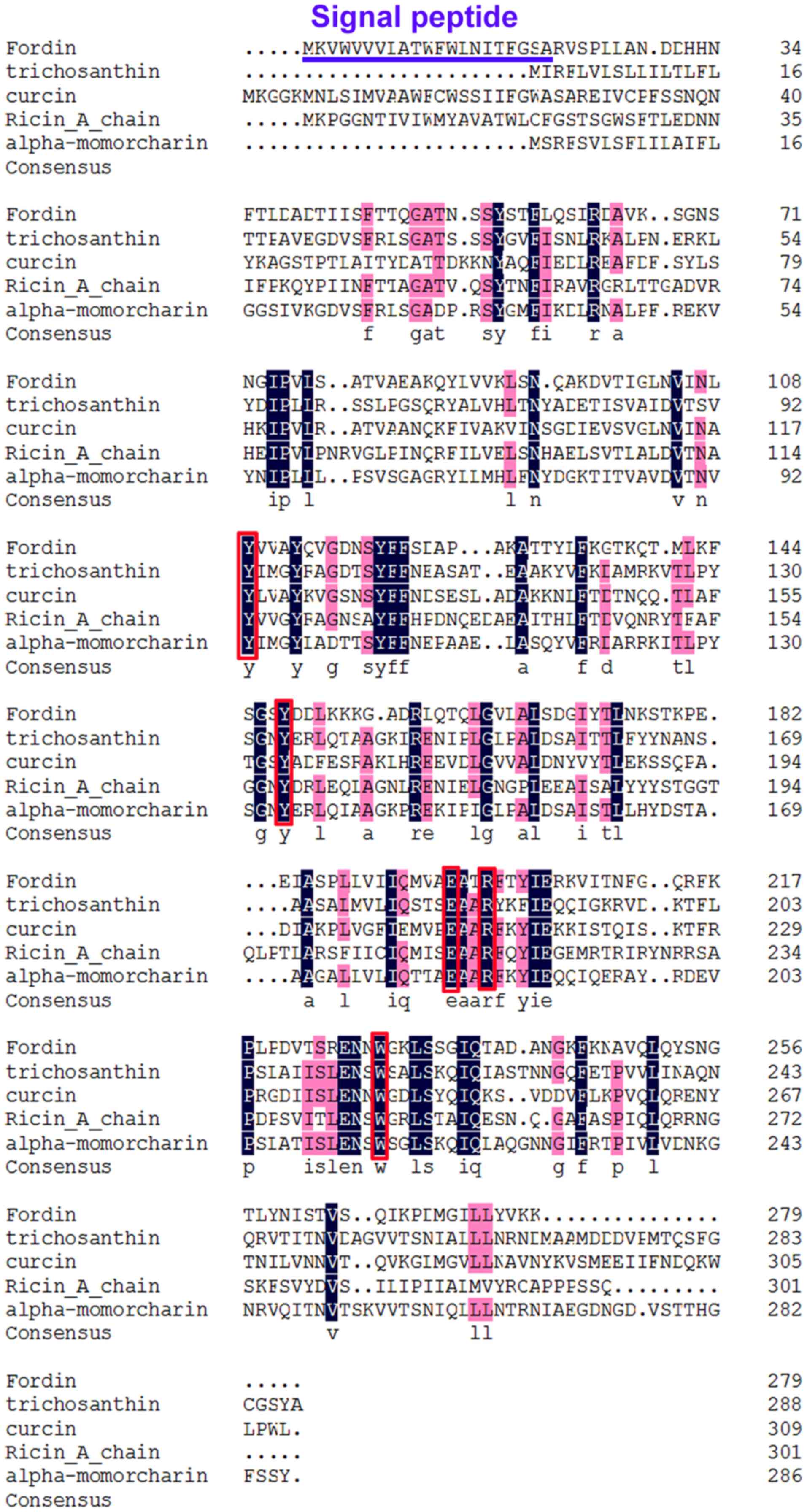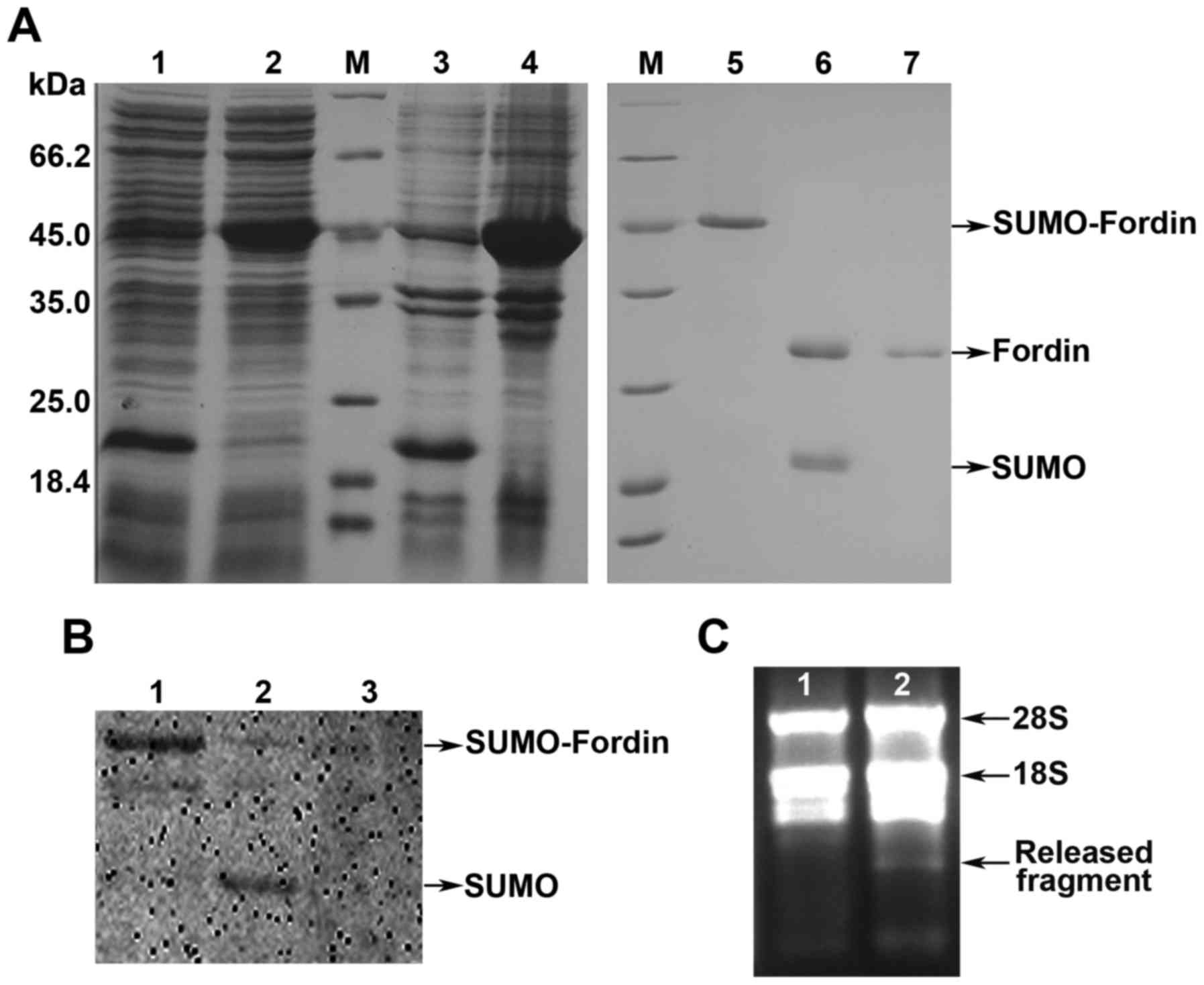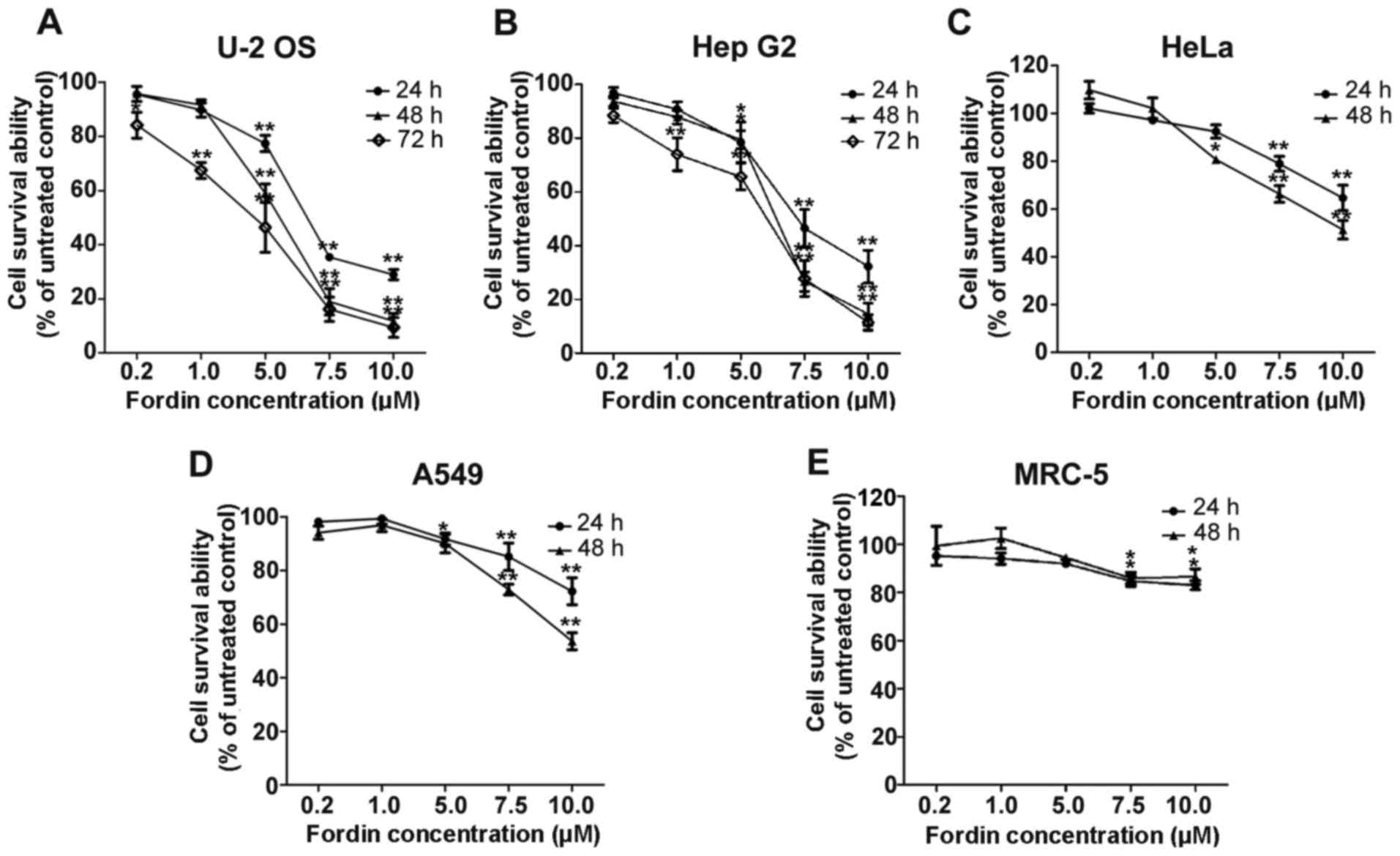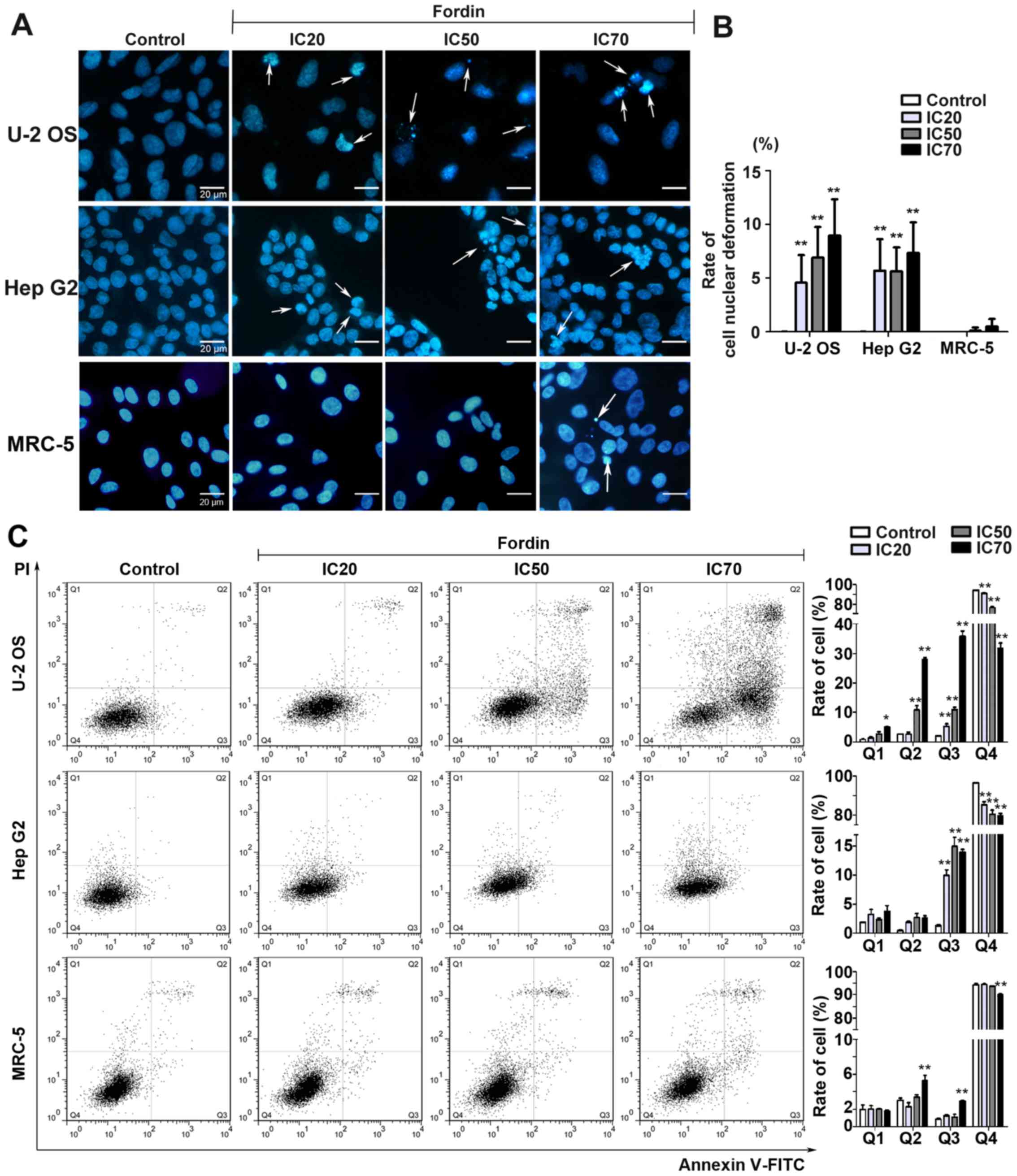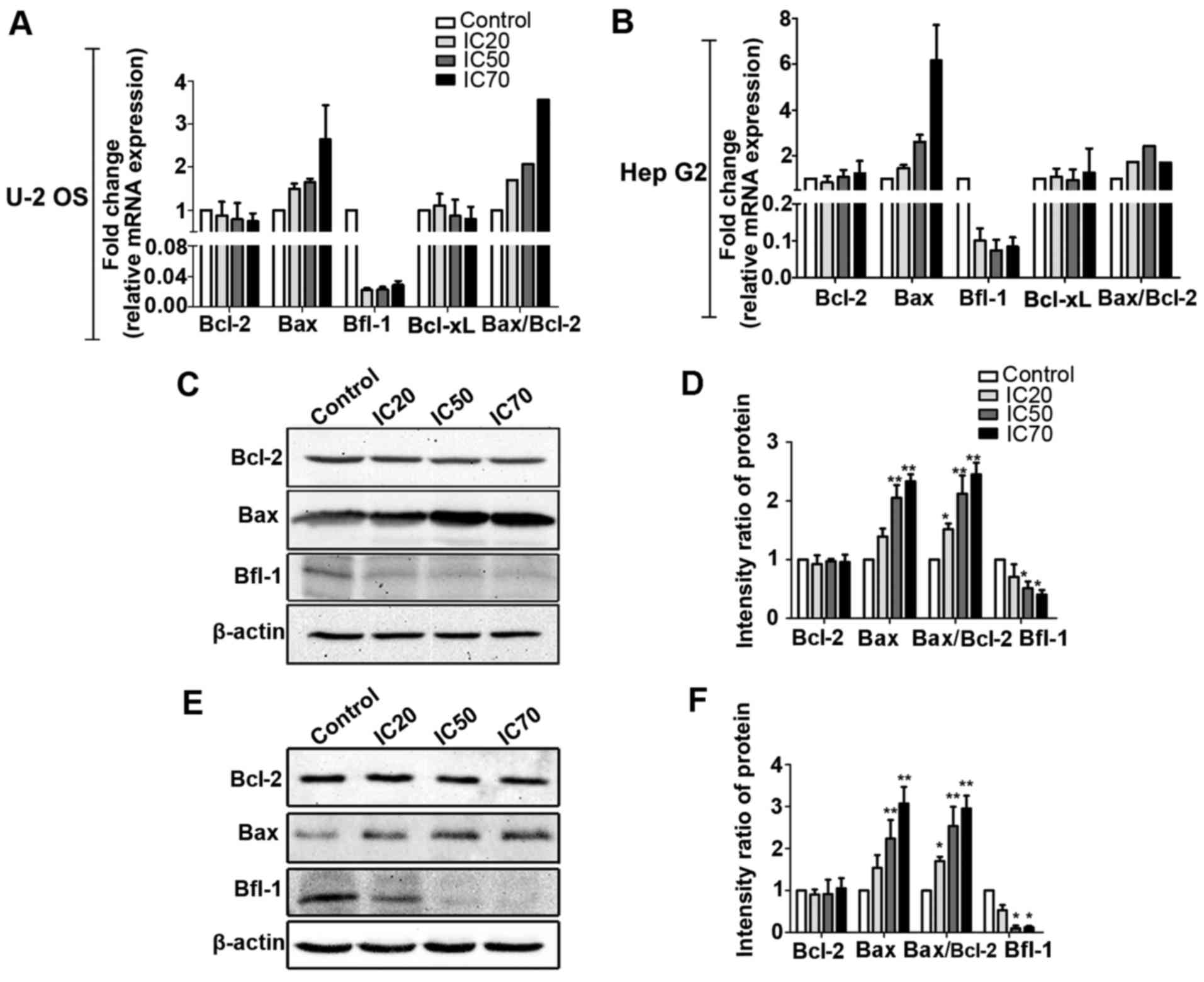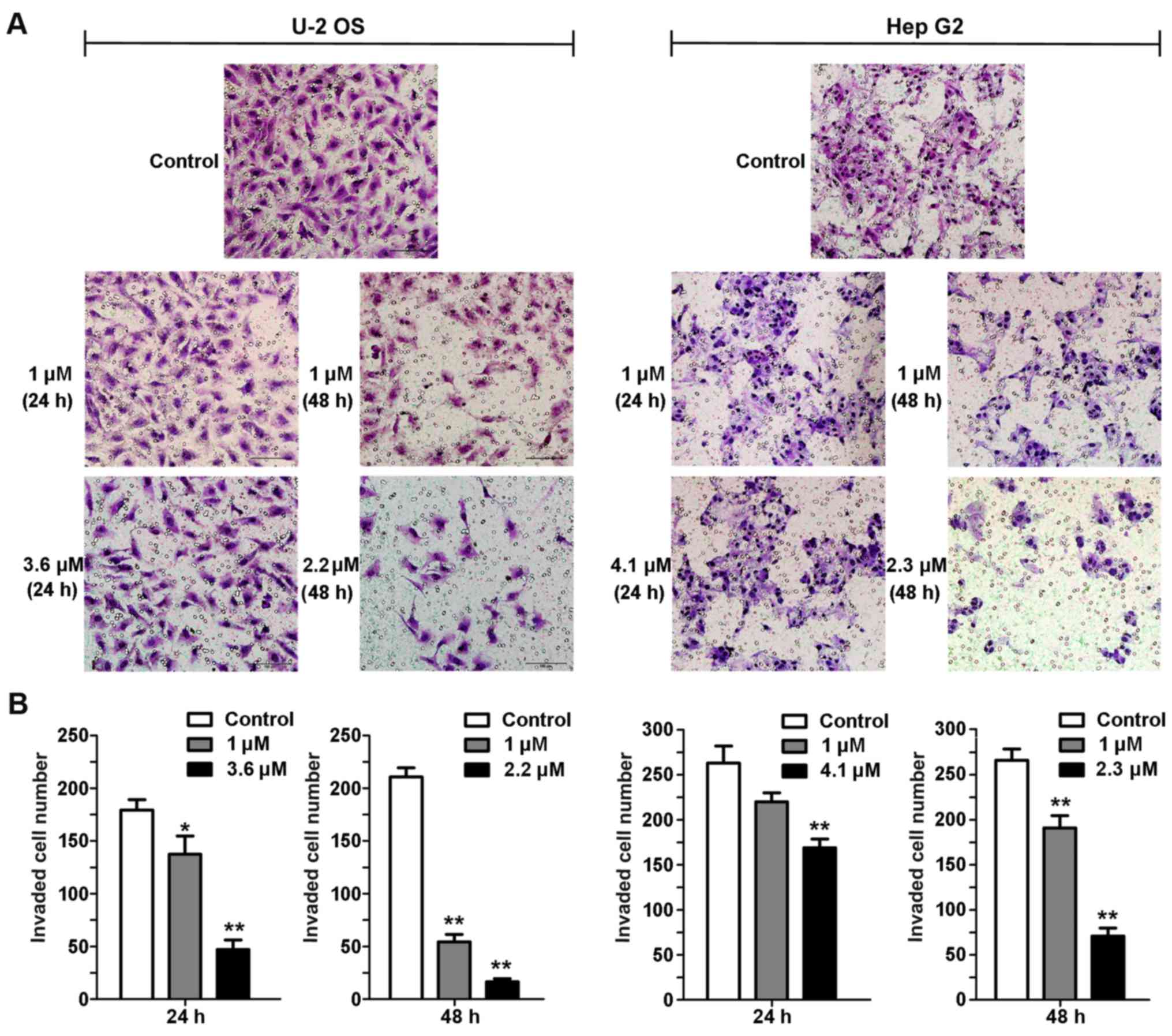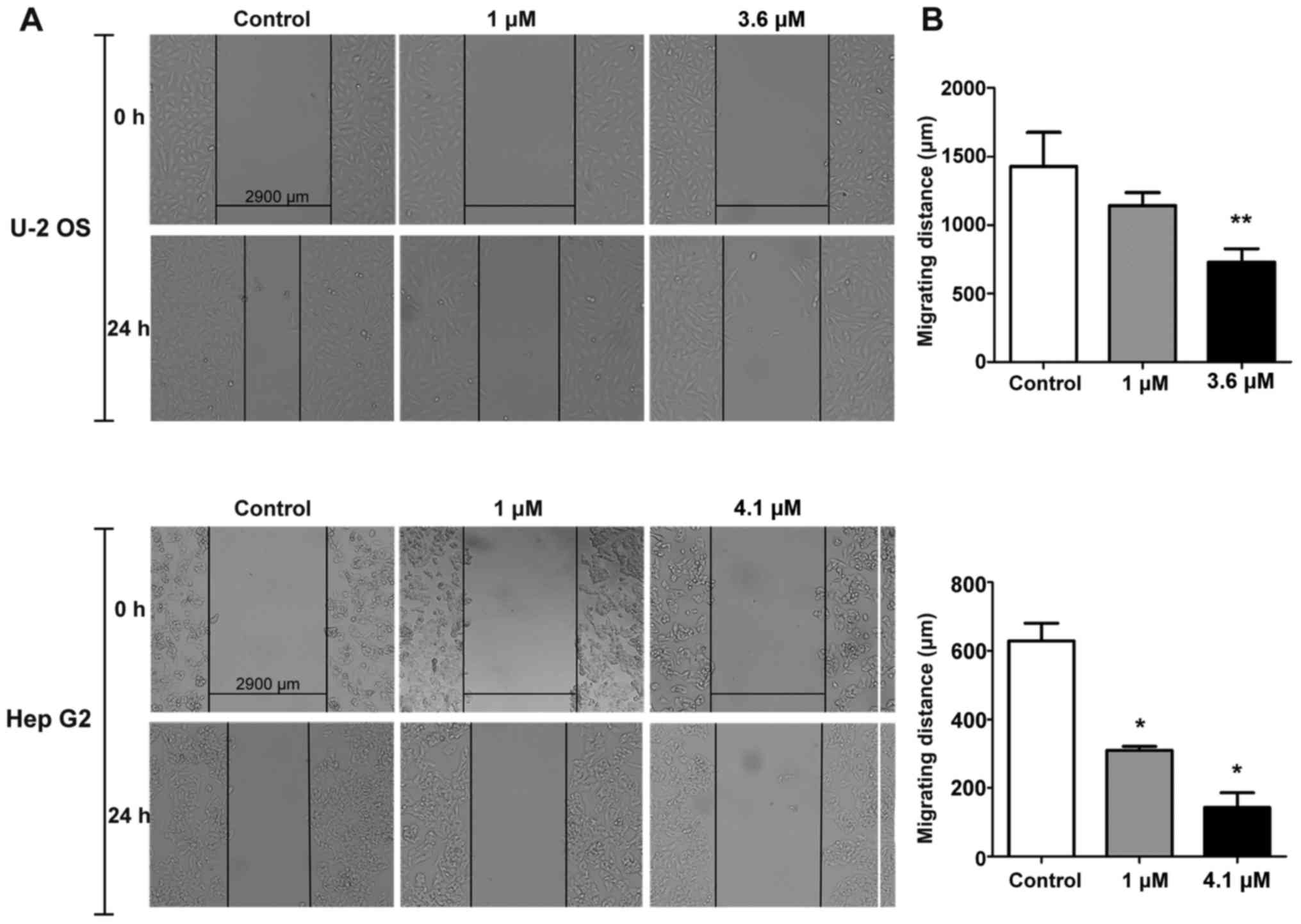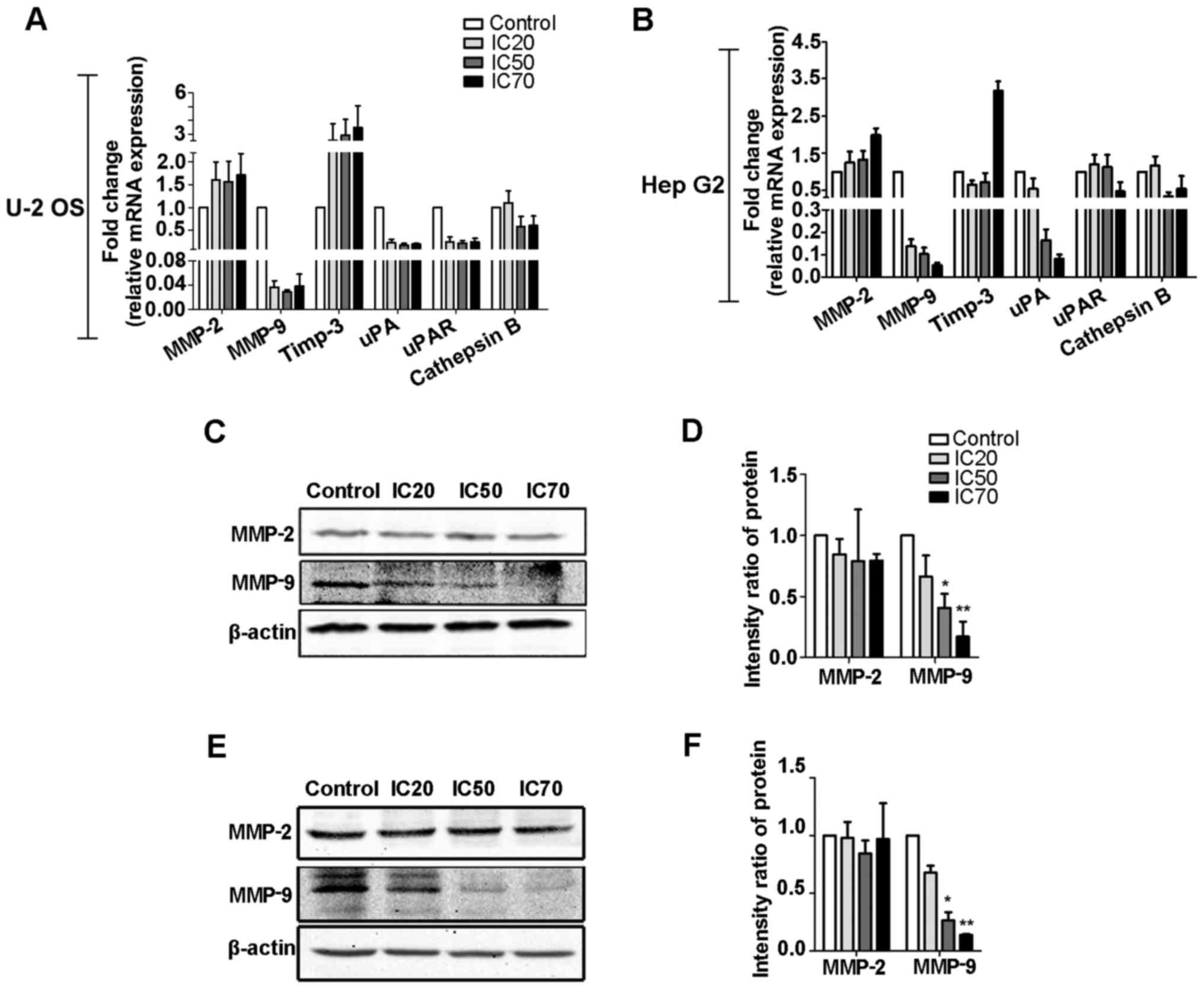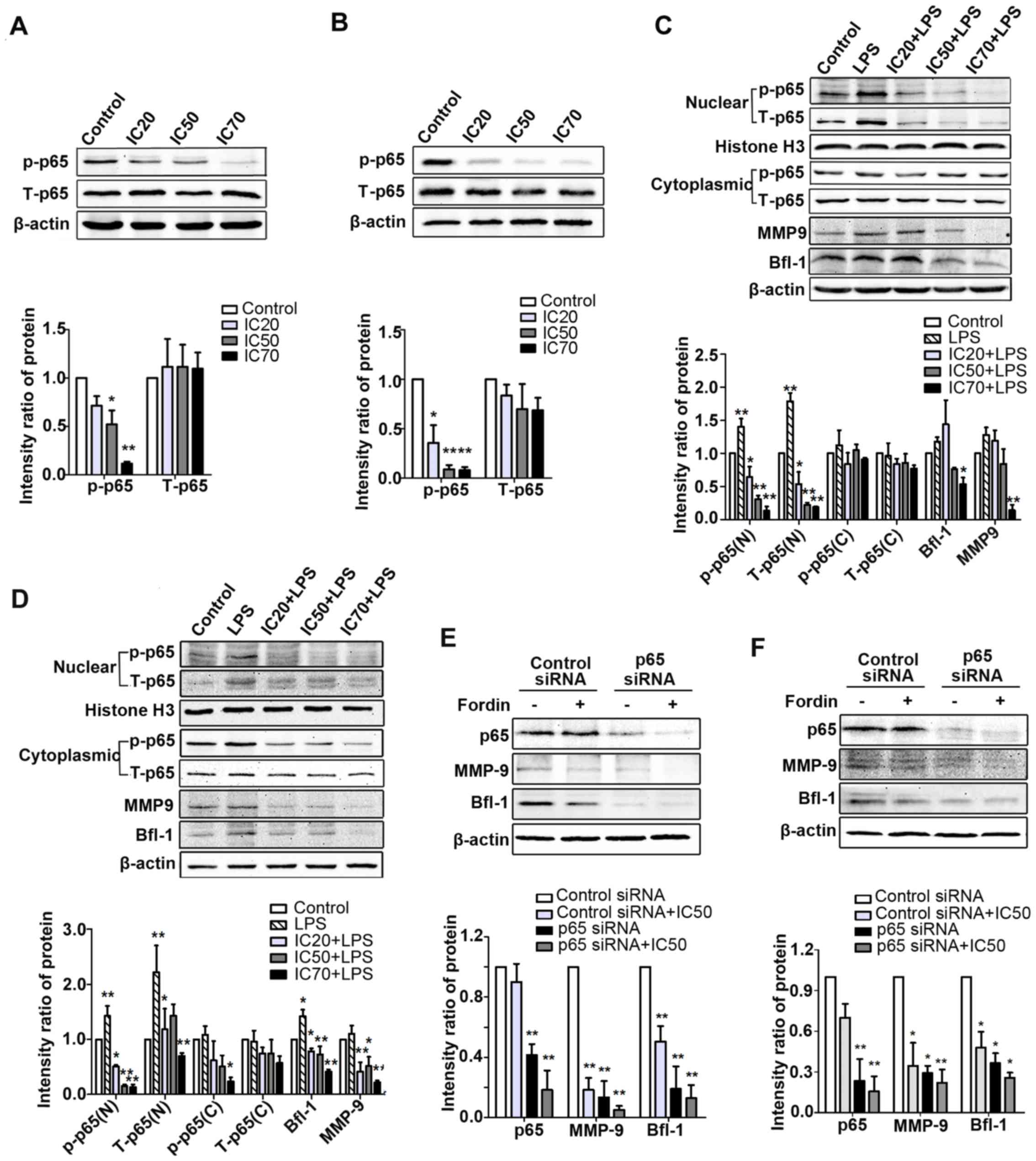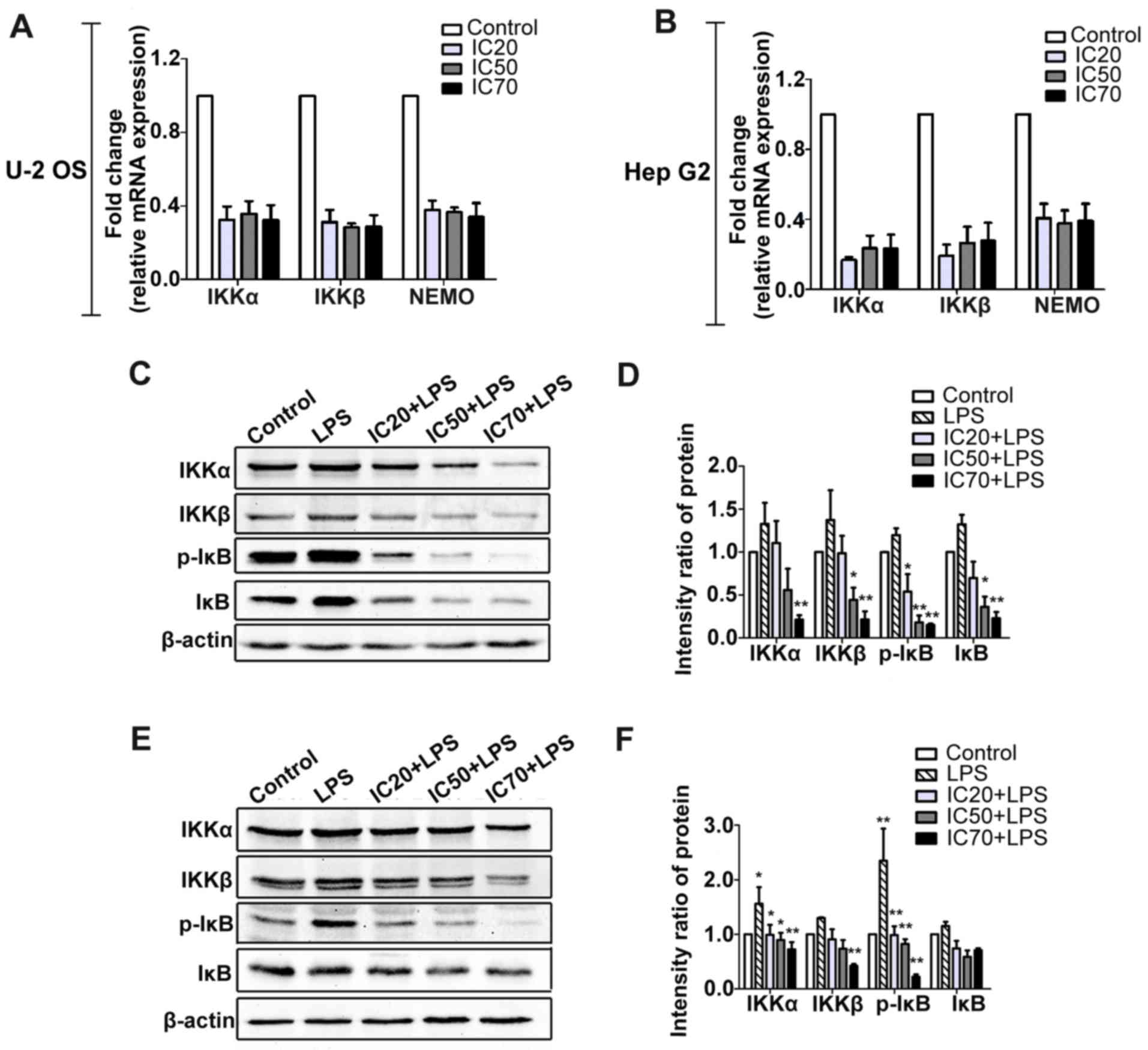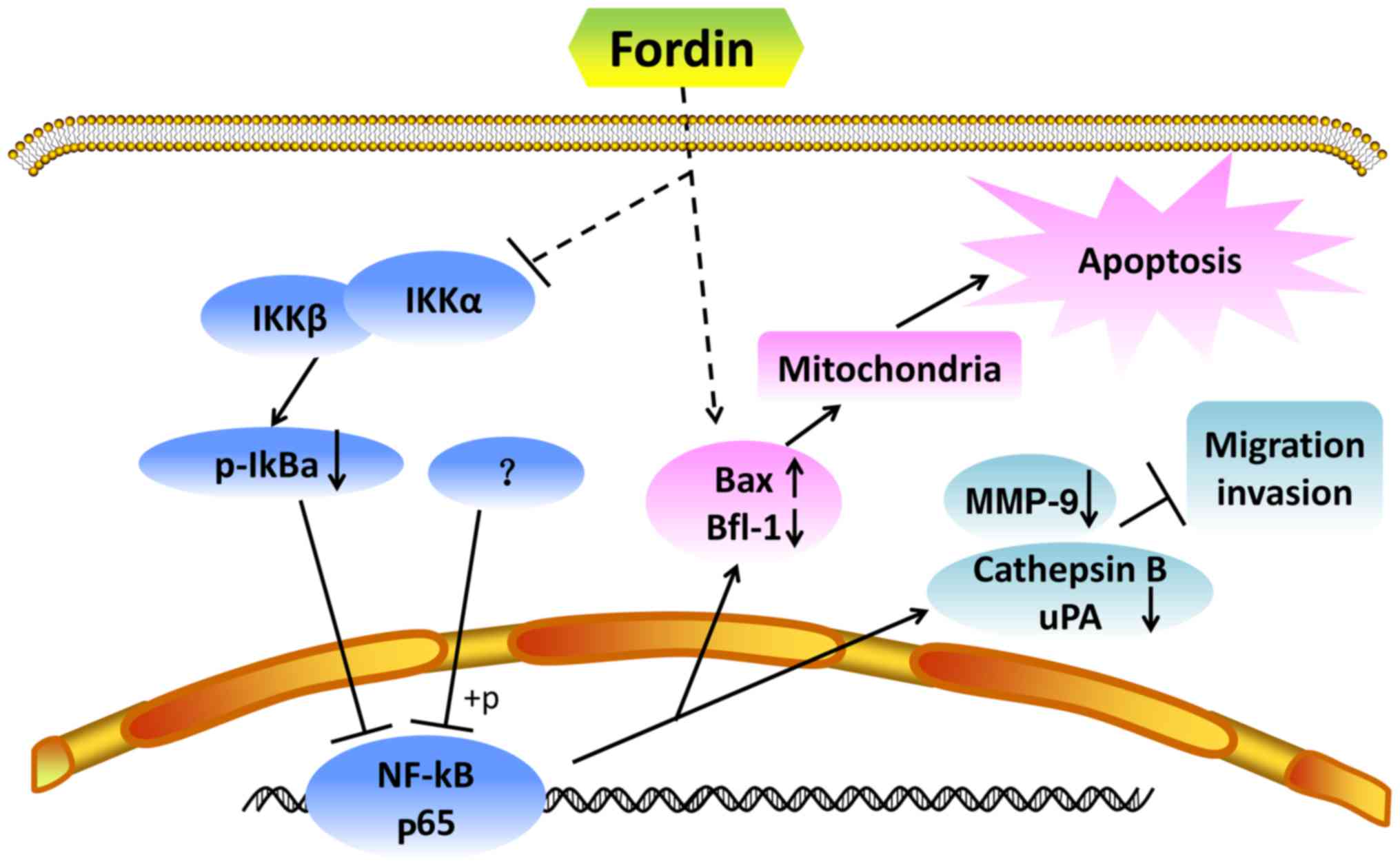|
1
|
Girbés T, Ferreras JM, Arias FJ and Stirpe
F: Description, distribution, activity and phylogenetic
relationship of ribosome-inactivating proteins in plants, fungi and
bacteria. Mini Rev Med Chem. 4:461–476. 2004. View Article : Google Scholar : PubMed/NCBI
|
|
2
|
Stirpe F: Ribosome-inactivating proteins.
Toxicon. 44:371–383. 2004. View Article : Google Scholar : PubMed/NCBI
|
|
3
|
Stirpe F and Battelli MG:
Ribosome-inactivating proteins: Progress and problems. Cell Mol
Life Sci. 63:1850–1866. 2006. View Article : Google Scholar : PubMed/NCBI
|
|
4
|
Li J, Xia X, Ke Y, Nie H, Smith MA and Zhu
X: Trichosanthin induced apoptosis in HL-60 cells via mitochondrial
and endoplasmic reticulum stress signaling pathways. Biochim
Biophys Acta. 1770:1169–1180. 2007. View Article : Google Scholar : PubMed/NCBI
|
|
5
|
Polito L, Bortolotti M, Mercatelli D,
Battelli MG and Bolognesi A: Saporin-S6: A useful tool in cancer
therapy. Toxins (Basel). 5:1698–1722. 2013. View Article : Google Scholar
|
|
6
|
Mohamed MS, Veeranarayanan S, Poulose AC,
Nagaoka Y, Minegishi H, Yoshida Y, Maekawa T and Kumar DS: Type 1
ribotoxin-curcin conjugated biogenic gold nanoparticles for a
multimodal therapeutic approach towards brain cancer. Biochim
Biophys Acta. 1840:1657–1669. 2014. View Article : Google Scholar
|
|
7
|
Smith ME and Hayoun MA: Toxicity, Ricin.
StatPearls (Internet); Jun 10–2017, Epub ahead of print.
|
|
8
|
Puri M, Kaur I, Perugini MA and Gupta RC:
Ribosome-inactivating proteins: Current status and biomedical
applications. Drug Discov Today. 17:774–783. 2012. View Article : Google Scholar : PubMed/NCBI
|
|
9
|
Puri M: 'Momordica balsamina: a medicinal
and neutraceutical plant for health care management'. Comments:
biotechnological potential of M. balsamina revealed. Curr Pharm
Biotechnol. 11:229. 2010. View Article : Google Scholar
|
|
10
|
Polito L, Bortolotti M, Pedrazzi M,
Mercatelli D, Battelli MG and Bolognesi A: Apoptosis and
necroptosis induced by stenodactylin in neuroblastoma cells can be
completely prevented through caspase inhibition plus catalase or
necrostatin-1. Phytomedicine. 23:32–41. 2016. View Article : Google Scholar : PubMed/NCBI
|
|
11
|
Panda PK, Behera B, Meher BR, Das DN,
Mukhopadhyay S, Sinha N, Naik PP, Roy B, Das J, Paul S, et al:
Abrus Agglutinin, a type II ribosome inactivating protein inhibits
Akt/PH domain to induce endoplasmic reticulum stress mediated
autophagy-dependent cell death. Mol Carcinog. 56:389–401. 2017.
View Article : Google Scholar
|
|
12
|
College JN: Dictionary of Chinese Materia
Medica. Journal. 1977.
|
|
13
|
Piccirilli A, Piccardi N and Miska P: Use
of at least one conjugated triene-containing fatty acid for
preparing a medicine for treating inflammation. US Patent
2008/0045594 A1. Filed July 26, 2004; issued February 2, 2008.
|
|
14
|
Igarashi M and Miyazawa T: Newly
recognized cytotoxic effect of conjugated trienoic fatty acids on
cultured human tumor cells. Cancer Lett. 148:173–179. 2000.
View Article : Google Scholar : PubMed/NCBI
|
|
15
|
Belury MA: Dietary conjugated linoleic
acid in health: Physiological effects and mechanisms of action.
Annu Rev Nutr. 22:505–531. 2002. View Article : Google Scholar : PubMed/NCBI
|
|
16
|
Mao Y, Liu W, Chen X, Xu Y, Lu W, Hou J,
Ni J, Wang Y and Wu L: Flower development and sex determination
between male and female flowers in Vernicia fordii. Front Plant
Sci. 8:12912017. View Article : Google Scholar :
|
|
17
|
Polito L, Bortolotti M, Maiello S,
Battelli MG and Bolognesi A: Plants producing ribosome-inactivating
proteins in traditional medicine. Molecules. 21:212016. View Article : Google Scholar
|
|
18
|
Fang EF, Zhang CZ, Wong JH, Shen JY, Li CH
and Ng TB: The MAP30 protein from bitter gourd (Momordica
charantia) seeds promotes apoptosis in liver cancer cells in vitro
and in vivo. Cancer Lett. 324:66–74. 2012. View Article : Google Scholar : PubMed/NCBI
|
|
19
|
Pan WL, Wong JH, Fang EF, Chan YS, Ng TB
and Cheung RC: Preferential cytotoxicity of the type I ribosome
inactivating protein alpha-momorcharin on human nasopharyngeal
carcinoma cells under normoxia and hypoxia. Biochem Pharmacol.
89:329–339. 2014. View Article : Google Scholar : PubMed/NCBI
|
|
20
|
Roy S, Axup JY, Forsyth JS, Goswami RK,
Hutchins BM, Bajuri KM, Kazane SA, Smider VV, Felding BH and Sinha
SC: SMI-Ribosome inactivating protein conjugates selectively
inhibit tumor cell growth. Chem Commun (Camb). 53:4234–4237. 2017.
View Article : Google Scholar
|
|
21
|
Wang P, Xu J and Zhang C: CREB, a possible
upstream regulator of Bcl-2 in trichosanthin-induced HeLa cell
apoptosis. Mol Biol Rep. 37:1891–1896. 2010. View Article : Google Scholar
|
|
22
|
Baud V and Karin M: Is NF-kappaB a good
target for cancer therapy? Hopes and pitfalls. Nat Rev Drug Discov.
8:33–40. 2009. View Article : Google Scholar : PubMed/NCBI
|
|
23
|
Sweeney CJ, Mehrotra S, Sadaria MR, Kumar
S, Shortle NH, Roman Y, Sheridan C, Campbell RA, Murry DJ, Badve S,
et al: The sesquiterpene lactone parthenolide in combination with
docetaxel reduces metastasis and improves survival in a xenograft
model of breast cancer. Mol Cancer Ther. 4:1004–1012. 2005.
View Article : Google Scholar : PubMed/NCBI
|
|
24
|
Lwin T, Hazlehurst LA, Li Z, Dessureault
S, Sotomayor E, Moscinski LC, Dalton WS and Tao J: Bone marrow
stromal cells prevent apoptosis of lymphoma cells by upregulation
of anti-apoptotic proteins associated with activation of NF-kappaB
(RelB/p52) in non-Hodgkin's lymphoma cells. Leukemia. 21:1521–1531.
2007. View Article : Google Scholar : PubMed/NCBI
|
|
25
|
Cao JP, Niu HY, Wang HJ, Huang XG and Gao
DS: NF-κB p65/p52 plays a role in GDNF up-regulating Bcl-2 and
Bcl-w expression in 6-OHDA-induced apoptosis of MN9D cell. Int J
Neurosci. 123:705–710. 2013. View Article : Google Scholar : PubMed/NCBI
|
|
26
|
Hecht M, von Metzler I, Sack K, Kaiser M
and Sezer O: Interactions of myeloma cells with osteoclasts promote
tumour expansion and bone degradation through activation of a
complex signalling network and upregulation of cathepsin K, matrix
metalloproteinases (MMPs) and urokinase plasminogen activator
(uPA). Exp Cell Res. 314:1082–1093. 2008. View Article : Google Scholar
|
|
27
|
Feng AH, Zhang GM, Qi ZG and Fan J:
Functional determination of recombinant maize f and m type
rhioredoxin and entrapment of target proteins. Zhongguo Sheng Wu
Gong Cheng Za Zhi. 30:63–68. 2010.In Chinese.
|
|
28
|
Malakhov MP, Mattern MR, Malakhova OA,
Drinker M, Weeks SD and Butt TR: SUMO fusions and SUMO-specific
protease for efficient expression and purification of proteins. J
Struct Funct Genomics. 5:75–86. 2004. View Article : Google Scholar : PubMed/NCBI
|
|
29
|
Wu Y, Mao Y, Jin S, Hou J, Du H, Yang M
and Wu L: Identification, characterization and structure analysis
of a type I ribosome-inactivating protein from Sapium sebiferum
(Euphorbiaceae). Biochem Biophys Res Commun. 463:557–562. 2015.
View Article : Google Scholar : PubMed/NCBI
|
|
30
|
López-Terrada D, Cheung SW, Finegold MJ
and Knowles BB: Hep G2 is a hepatoblastoma-derived cell line. Hum
Pathol. 40:1512–1515. 2009. View Article : Google Scholar : PubMed/NCBI
|
|
31
|
Livak KJ and Schmittgen TD: Analysis of
relative gene expression data using real-time quantitative PCR and
the 2(−ΔΔC(T)) method. Methods. 25:402–408. 2001. View Article : Google Scholar
|
|
32
|
Severino V, Paiardini A, Pascarella S,
Parente A and Chambery A: Structural analysis of toxic volkensin, a
type 2 ribosome inactivating protein from Adenia volkensii Harm
(kilyambiti plant): Molecular modeling and surface analysis by
computational methods and limited proteolysis. Int J Biol Macromol.
45:407–413. 2009. View Article : Google Scholar : PubMed/NCBI
|
|
33
|
Chang CH, Lin HC, Chang CH, Chang CC and
Hsu SH: Potential of domestically produced and imported tung
(Vernicia fordii) seeds for biofuels. J Biobased Mater Bioenergy.
7:512–515. 2013. View Article : Google Scholar
|
|
34
|
Schep LJ, Temple WA, Butt GA and Beasley
MD: Ricin as a weapon of mass terror - separating fact from
fiction. Environ Int. 35:1267–1271. 2009. View Article : Google Scholar : PubMed/NCBI
|
|
35
|
Bayer H, Essig K, Stanzel S, Frank M,
Gildersleeve JC, Berger MR and Voss C: Evaluation of riproximin
binding properties reveals a novel mechanism for cellular
targeting. J Biol Chem. 287:35873–35886. 2012. View Article : Google Scholar : PubMed/NCBI
|
|
36
|
Pervaiz A, Adwan H and Berger MR:
Riproximin: A type II ribosome inactivating protein with
anti-neoplastic potential induces IL24/MDA-7 and GADD genes in
colorectal cancer cell lines. Int J Oncol. 47:981–990. 2015.
View Article : Google Scholar : PubMed/NCBI
|
|
37
|
Guo M, Mathieu PA, Linebaugh B, Sloane BF
and Reiners JJ Jr: Phorbol ester activation of a proteolytic
cascade capable of activating latent transforming growth
factor-betaL a process initiated by the exocytosis of cathepsin B.
J Biol Chem. 277:14829–14837. 2002. View Article : Google Scholar : PubMed/NCBI
|
|
38
|
Egeblad M and Werb Z: New functions for
the matrix metal-loproteinases in cancer progression. Nat Rev
Cancer. 2:161–174. 2002. View
Article : Google Scholar : PubMed/NCBI
|
|
39
|
Ranuncolo SM, Armanasco E, Cresta C, Bal
De Kier Joffe E and Puricelli L: Plasma MMP-9 (92 kDa-MMP) activity
is useful in the follow-up and in the assessment of prognosis in
breast cancer patients. Int J Cancer. 106:745–751. 2003. View Article : Google Scholar : PubMed/NCBI
|
|
40
|
Talvensaari-Mattila A, Pääkkö P and
Turpeenniemi-Hujanen T: Matrix metalloproteinase-2 (MMP-2) is
associated with survival in breast carcinoma. Br J Cancer.
89:1270–1275. 2003. View Article : Google Scholar : PubMed/NCBI
|
|
41
|
Grünwald B, Vandooren J, Gerg M, Ahomaa K,
Hunger A, Berchtold S, Akbareian S, Schaten S, Knolle P, Edwards
DR, et al: Systemic ablation of MMP-9 triggers invasive growth and
metastasis of pancreatic cancer via deregulation of IL6 expression
in the bone marrow. Mol Cancer Res. 14:1147–1158. 2016. View Article : Google Scholar : PubMed/NCBI
|
|
42
|
Roy R, Yang J and Moses MA: Matrix
metalloproteinases as novel biomarkers and potential therapeutic
targets in human cancer. J Clin Oncol. 27:5287–5297. 2009.
View Article : Google Scholar : PubMed/NCBI
|
|
43
|
Hu R, Zhai Q, Liu W and Liu X: An insight
into the mechanism of cytotoxicity of ricin to hepatoma cell: Roles
of Bcl-2 family proteins, caspases, Ca(2+)-dependent proteases and
protein kinase. C J Cell Biochem. 81:583–593. 2001. View Article : Google Scholar
|
|
44
|
Sandur SK, Ichikawa H, Sethi G, Ahn KS and
Aggarwal BB: Plumbagin (5-hydroxy-2-methyl-1,4-naphthoquinone)
suppresses NF-kappaB activation and NF-kappaB-regulated gene
products through modulation of p65 and IkappaBalpha kinase
activation, leading to potentiation of apoptosis induced by
cytokine and chemotherapeutic agents. J Biol Chem. 281:17023–17033.
2006. View Article : Google Scholar : PubMed/NCBI
|
|
45
|
Tarte K, Jourdan M, Veyrune JL, Berberich
I, Fiol G, Redal N, Shaughnessy J Jr and Klein B: The Bcl-2 family
member Bfl-1/A1 is strongly repressed in normal and malignant
plasma cells but is a potent anti-apoptotic factor for myeloma
cells. Br J Haematol. 125:373–382. 2004. View Article : Google Scholar : PubMed/NCBI
|
|
46
|
Grumont RJ, Rourke IJ and Gerondakis S:
Rel-dependent induction of A1 transcription is required to protect
B cells from antigen receptor ligation-induced apoptosis. Genes
Dev. 13:400–411. 1999. View Article : Google Scholar : PubMed/NCBI
|
|
47
|
Mödder UI, Oursler MJ, Khosla S and Monroe
DG: Wnt10b activates the Wnt, notch, and NFκB pathways in U2OS
osteo-sarcoma cells. J Cell Biochem. 112:1392–1402. 2011.
View Article : Google Scholar
|
|
48
|
Westhoff MA, Zhou S, Nonnenmacher L,
Karpel-Massler G, Jennewein C, Schneider M, Halatsch ME, Carragher
NO, Baumann B, Krause A, et al: Inhibition of NF-κB signaling
ablates the invasive phenotype of glioblastoma. Mol Cancer Res.
11:1611–1623. 2013. View Article : Google Scholar : PubMed/NCBI
|
|
49
|
Iyer SV, Ranjan A, Elias HK, Parrales A,
Sasaki H, Roy BC, Umar S, Tawfik OW and Iwakuma T: Genome-wide RNAi
screening identifies TMIGD3 isoform1 as a suppressor of NF-κB and
osteosarcoma progression. Nat Commun. 7:135612016. View Article : Google Scholar
|
|
50
|
Jiang C, Fang X, Zhang H, Wang X, Li M,
Jiang W, Tian F, Zhu L and Bian Z: AMD3100 combined with triptolide
inhibit proliferation, invasion and metastasis and induce apoptosis
of human U2OS osteosarcoma cells. Biomed Pharmacother. 86:677–685.
2017. View Article : Google Scholar
|
|
51
|
Li CT, Lin CH, Kao TY, Wu MF, Yeh CS, Yeh
KT and Ko JL: The mechanisms of action of Tianhua(™) on antitumor
activity in lung cancer cells. Pharm Biol. 48:1302–1309. 2010.
View Article : Google Scholar : PubMed/NCBI
|
|
52
|
Li M, Li X and Li JC: Possible mechanisms
of trichosanthin-induced apoptosis of tumor cells. Anat Rec
(Hoboken). 293:986–992. 2010. View Article : Google Scholar
|
|
53
|
Mukhopadhyay S, Panda PK, Das DN, Sinha N,
Behera B, Maiti TK and Bhutia SK: Abrus agglutinin suppresses human
hepatocellular carcinoma in vitro and in vivo by inducing
caspase-mediated cell death. Acta Pharmacol Sin. 35:814–824. 2014.
View Article : Google Scholar : PubMed/NCBI
|
|
54
|
Khil LY, Kim W, Lyu S, Park WB, Yoon JW
and Jun HS: Mechanisms involved in Korean mistletoe lectin-induced
apoptosis of cancer cells. World J Gastroenterol. 13:2811–2818.
2007. View Article : Google Scholar : PubMed/NCBI
|
|
55
|
Karin M: Nuclear factor-kappaB in cancer
development and progression. Nature. 441:431–436. 2006. View Article : Google Scholar : PubMed/NCBI
|















